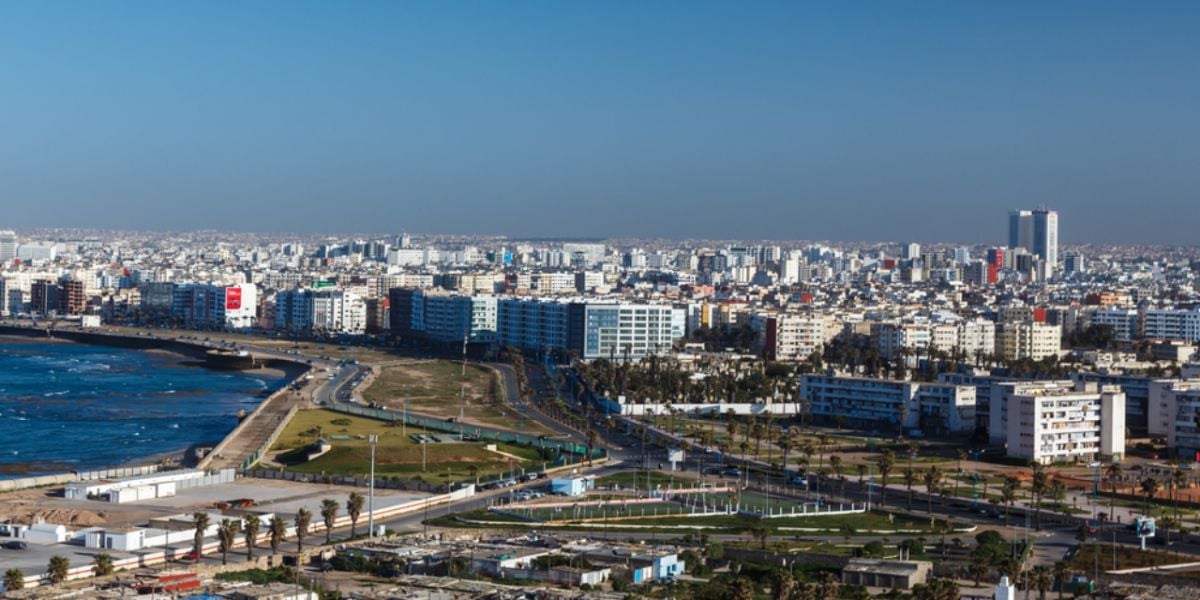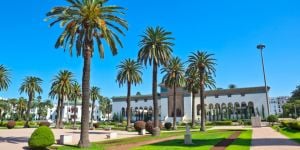
Being the economic capital of Morocco, Casablanca offers a wide range of possibilities to study after high school. Without being biased on the level of courses dispensed, let's have a look at the different universities and schools in Casablanca and the programs offered.
First of all, it is essential to highlight that all higher education institutions in Casablanca, whether public or private, are equal in terms of recognition of diplomas and certificates - which was not the case some years back.
For post-baccalaureate studies, Casablanca offers training in nearly all existing fields in Morocco. You can find anything from architecture to trade, accounting, engineering, law and economics, medical and dental faculties.
Public universities in Casablanca
Public universities are not very selective on entries. There are exceptions like the law and medical universities, but for how long? These faculties had, until lately, exclusivity to university education. However, while medical schools apply stringent entry requirements (an average of 18/20 at the Moroccan baccalaureate, which has a rate of failure above 50%), law schools are very lenient. Note that public universities are linked to the University of Hassan II of Casablanca, one of the three most important in the country, with Rabat and the one situated in Marrakech (the highest grade of African countries in the international ranking).
Hassan II University of Casablanca
The University Hassan II of Casablanca (UH2C) is located in Aïn Chock, Casablanca. It consists of eighteen faculties and schools spread across the cities of Casablanca and Mohammedia. It enrolls 120,000 male and female students, with international students constituting a large proportion, making it the second destination for international students after Mohammed V University.
Private universities in Casablanca
The recent opening of two new private universities in Casablanca shattered the monopoly held by the faculties mentioned above. As they have just started operating, it is difficult to have a real idea of the level of the courses offered. However, one thing is for sure: entry selection is carried out on a massive scale, as evidenced by applications and the costs of studies.
International University of Casablanca
The International University of Casablanca (UIC) is a Private University accredited by the government. It is a member of Laureate International Universities, which is the world's premier network of private universities. The university was opened in September 2010 and comprises a Faculty of Health Sciences, a School of Engineering, a Faculty of Business and Management, and a Programme of Hotel and Sports Management, offering a total of more than twenty-five degrees recognized at national and international levels.
International schools in Casablanca
Since many years, international schools have been opening local institutions, either in partnership with local schools or on their own. For example, l'École de Management de Lyon (EM Lyon) and Toulouse Business School (TBS), that are established in Casablanca both offer possibilities or mandatory training abroad as part of the study program. In the future, chances are that this practice will be more widespread, mainly due to the presence of a larger number of international schools in Casablanca. Besides the prestigious French institutions like AEFE and OSUI, there are two American schools, one British school and one Belgian school.
Selection by these institutions depends on your financial status, taking into account the budget for the subscription (subject to scholarship scheme mainly for French students from French schools, for example).
Good to know:
In the local labor market, an international degree is more highly valued than a Moroccan diploma.
Choosing a university in Casablanca
If you are looking to study in Casablanca, some things need to be clear: public universities (not only) are mostly located in an off-centred area (Oulfa), but these are accessible by train and tramway. Transportation in Casablanca is thus not an issue, even if you don't live in the surrounding neighborhood. Other institutions like the International University of Casablanca, which is private, is located out of town. Even if it offers its own bus service, this can be complicated and costly.
Enrolment system in Moroccan universities
Moroccan universities are open to all students who have obtained a Moroccan Baccalaureate (high school) diploma or its equivalent in all majors. A registration file for foreigners should normally include the following items:
- An application form;
- Two photographs of the student;
- Four stamped envelopes bearing the student's home address;
- A copy of the student's birth certificate;
- A copy of the international student's national identity card or passport;
- The original copy of the Baccalaureate degree together with two additional copies;
- A study permit issued by the Ministry of Higher Education.
If you are a foreigner and wish to study in Casablanca at your own expense, you must submit a special file to get the equivalence of your diplomas from the Ministry of Higher Education or from the office responsible for administering the institution in which you wish to enrol, together with a written request sent to the dean accompanied by a copy of the duly certified diploma obtained, as well as your detailed transcripts of the programs and results obtained during the last few years. This next step is to fill in the equivalence form and submit it with the original copies of your academic certificates, with a view to completing your higher education studies.
In most faculties, the study period is three years with an additional year, and each academic year consists of two semesters, with each semester consisting of four units. Such a period can be extended to five years.
BMD university educational system in Morocco
The educational system of BMD is centered around a course of study called Parcours, which is organized into three levels of unit-based teaching:
- Level 1: The Bachelor's Course (B) involves six semesters of study ending in a Bachelor's degree in fundamental or professional studies (Bac 3).
- Level 2: The Master's Course (M) encompasses four semesters of study after the Bachelor's degree and leads to a Master's or specialized Master's degree.
- Level 3: Doctorate (D), whereby the course of study requires three years and can be extended to five years to finish a doctoral thesis.
Breakdown of the Academic Year
Each academic year consists of two semesters, each containing sixteen weeks of training and examinations;
- Autumn semester: from September to mid-February.
- Spring semester: from mid-February to the end of July.
The Bachelor's program contains twenty-four credits, sixteen of which are dedicated to obtaining the Certificate of General Studies (DEUG).
There are four units in each semester with a total of 360 hours. Each unit covers 80 hours of training and examination time.
The language of instruction in Morocco
As Morocco is an Arab country, the official language is local Arabic (also known as Darija) together with Berber, making it easier for Arab students to study in Morocco. In addition, Moroccans speak French following the French colonization between 1912 and 1956, and it is used on a daily basis and is widely spoken, offering the chance for students who are fluent in French to study in this country. However, if you are not fluent in either of these two languages, there are many universities that offer study programs in English, such as Hassan II University of Casablanca.
Evaluation methods inside universities and schools in Morocco
Higher education institutions in Casablanca employ a variety of methods to assess students. These include assignments, course participation, tests and postgraduate surveys. Each institution sets norms for measuring the extent to which students complete their courses.
If a student does not complete a unit after continuous and final assessments, they may be given a make-up exam provided that they have obtained a mark of at least 05/20. In general, all units must be completed with a grade of at least 10/20 in order to succeed.
Scholarships for international students in Morocco
A 'Scholarship' is a form of academic support that helps students to continue their education and enhance their level of study with financial support (for tuition fees and living expenses) in several countries and universities around the world. So here's an overview of the differents scholarships available for international students in Morocco.
AMCI Scholarship
The Moroccan Agency for International Cooperation (AMCI) offers annual scholarships to international students who are pursuing their higher education in Morocco. To benefit from the AMCI scholarship, you must hold at least a Baccalaureate or any other equivalent degree, and you are required to be studying in a Moroccan public institution that issues a state diploma at the end of your studies. If you wish to receive this scholarship, you need to submit your application to the competent authorities of your country, and it will be forwarded to the Moroccan Agency for International Cooperation (AMCI).
Amideast program
Amideast is one of the world's leading international scholarship programs, offering a variety of scholarships and exchange opportunities for pre-university, graduate, postgraduate and professional levels. To apply for an Amideast scholarship, you need to provide your details on their website, and they will give you the scholarship that best suits your needs.
Qalam wa Lawh fully-funded scholarship:
The scholarship covers all tuition and accommodation costs throughout the study period. The program welcomes students from all over the world interested in learning Arabic and/or Dialectal Arabic (Darija).
EMMAG Erasmus Mundus scholarship
The EMMAG Erasmus Mundus scholarship program is intended for those students who are studying for a Bachelor's, Master's, or Doctorate as well as academic and administrative staff.
The countries that are eligible for this program outside the EU are as follows: Algeria, Morocco, Tunisia and Egypt.
The EMMAG Erasmus Mundus scholarship is eligible in the following institutions: Mohammed V Souissi University in Rabat, Cadi Ayyad University in Marrakech, Abdelmalek El Saadi University in Tangiers and Hassan II University in Casablanca.
Erasmus Mundus EU METALIC scholarship
The Erasmus Mundus EU METALIC scholarship program is offered to students who are studying for a Bachelor's, Master's, or Doctorate, as well as to academic and administrative staff.
The countries that are eligible for this program outside the EU are as follows: Algeria, Morocco, Tunisia and Libya.
The EMMAG Erasmus Mundus scholarship is eligible in the following institutions: Hassan II University of Casablanca, Institute of Science and Technology of Casablanca (SIST).
Conditions for obtaining a scholarship in Morocco
All scholarships have conditions associated with them, such as the need to provide certificates and documents. This is common to all scholarships, but there are some basic documents that are often endorsed in every scholarship:
- TOEFL or IELTS language certificates for English scholarships. Alternatively, language certificates of a certain level for German or French scholarships;
- Curriculum Vitae;
- Cover letter;
- Recommendation letters;
- Certificates of completion of various courses, workshops or voluntary services;
- Graduate GPA, which refers to the number of hours of study per week as well as the number of subjects studied at the university.
Visa application and stay in Casablanca
If you are a student, you can apply for a student visa at the nearest Moroccan embassy in your country of residence once you have been admitted to an accredited Moroccan institution (in this case, the university to which you have applied). Besides, you need to obtain a minimum of 40 points for your application in order to be allowed to enter Morocco on a student visa.
Post-graduation period in Casablanca
If you have successfully completed your studies, you may want to consider whether you want to continue your studies to the next stage, look for a job and settle in Casablanca, or return to your home country and start your career there. Should it be your choice to pursue your career in Casablanca, it is important to keep in mind that unemployment in Morocco is still a challenge, as the number of students in higher education is increasing every year.
The proportion of non-working university graduates is more than 13%, and this has doubled in the last five years and is expected to increase further in the coming years to 50%. Consequently, getting a job in Casablanca would not be an easy task. According to many Moroccans, it is necessary to have money or connections with influential people in order to find a job.
We do our best to provide accurate and up to date information. However, if you have noticed any inaccuracies in this article, please let us know in the comments section below.








